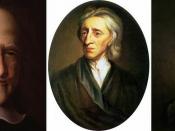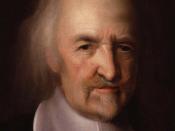Human nature, according to Oxford, is the shared psychological attributes of humankind that are assumed to be shared by all human beings. Thomas Hobbes, John Locke, and Jean-Jacques Rousseau were three philosophers that developed innovative theories regarding human nature. From Hobbes theory that humans are essentially hostile and bad, to Rousseau's claim that they are good and rational, the following examines and compares their philosophies on the state of nature, as well as their views on an ideal social contract(Loptson 219). Their philosophies on these matters have many interesting similarities, however, the differences between them are much more distinctive and are much more relevant when considering today's political context.
Thomas Hobbes describes the state of nature of man, as a state of war. (Bobbio 5) He claims that when people have a desire for the same thing, the natural result is chaos. It is the "natural condition of mankind" that would exist if there were no government or no social contract, and no laws.(Lemos
18) The state of nature is a war of "all against all," according to Hobbes, in which humans are in a never-ending pursuit of power and will destroy each other, if necessary to get it.(Lemos 20) This "state of war" happens because "all are equal in their capacity to harm one another, and everyone has a natural right to all things"(Bobbio 41). Life in the state of nature is essentially, poor, nasty, brutish and short.(Bobbio 44) According to Hobbes, the "state of war" is a result of three conflicts, which are, competition, diffidence and glory. Competition consists in the fact that in the state of nature, if there is some resource which a person wants there are no restraints on getting it other than the physical and mental powers of other people. Glory,


